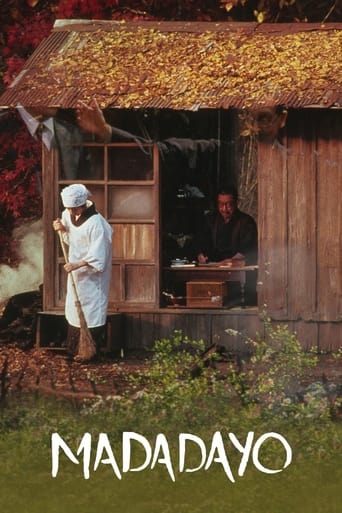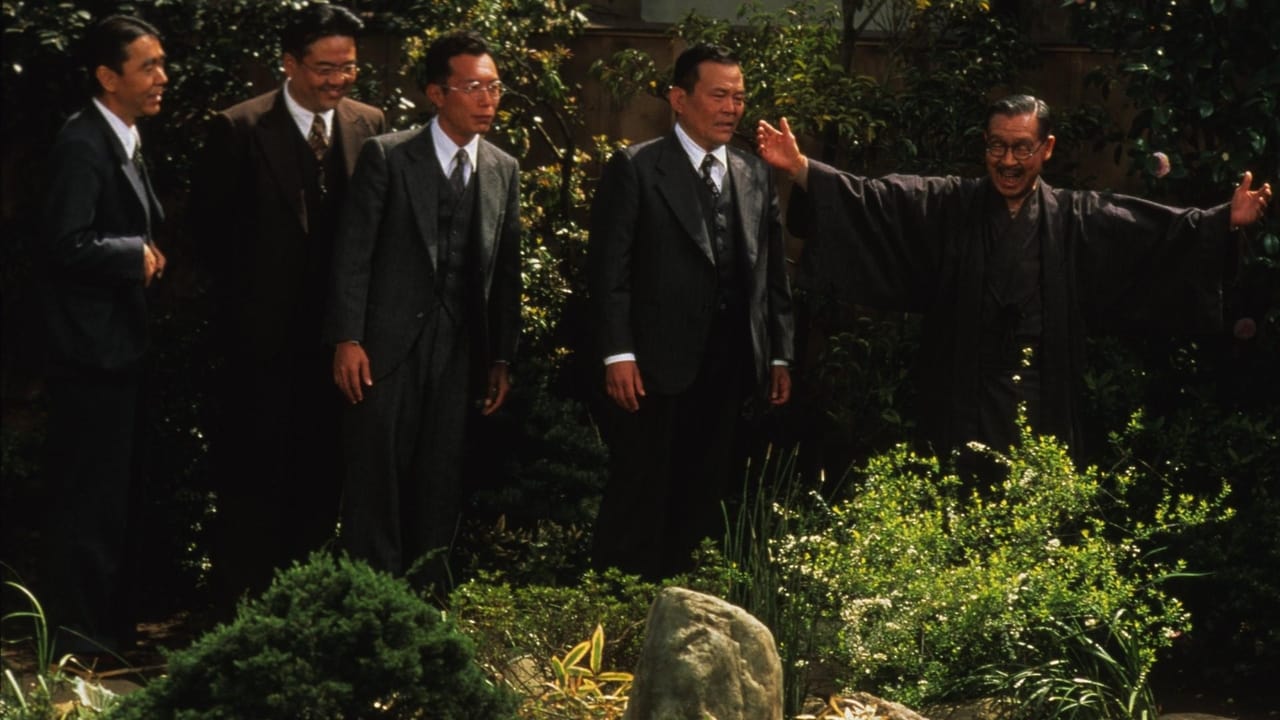Red-125
Madadayo (1993) was the last film written and directed by the great Akira Kurosawa. Sadly, although the movie bears touches of Kurosawa's genius, it is not a truly memorable film.The plot follows the life of a kindly professor, who retires from teaching but who is revered, respected, and almost worshiped by his former students. The problem for me was that we see the professor's many child-like foibles--which the students don't appear to mind--but we never see any evidence of the professor's greatness.The professor taught German, not philosophy or religion, so the subject matter of his lectures couldn't have been inherently inspiring. We are never told what he said within or outside of class that brings about the fervent admiration of his students.After the professor retires, he suffers a series of unpleasant incidents--some serious and some trivial. In each case he students come together to help restore his life to balance. In addition, they have a highly formalized party on his birthday each year. Eventually they include their wives, children, and grandchildren in these laudatory ceremonies.The film is not boring, and it excels in the crowd scenes as well as in the scenes of wartime destruction, but it never provides a central core of substance that would have made the details and incidents meaningful.We saw this film at the excellent Dryden Theatre at George Eastman House in Rochester. However, most of the action takes place indoors, and I'm sure the movie would work well on the small screen.
Chris Knipp
Kurosawa's last film was released in the US at his death, five years after it was made. It's the story of a retired schoolteacher and it's unabashedly sentimental and heartwarming, but unlike the lonely old man of the famous English schoolteacher tale Goodbye, Mr. Chips who has to be humanized and refuses to retire, Hyakken Uchida (Tatsuo Matsumura) is different from other men in his oddball attitude and intellectual accomplishments but neither lonely nor sad, and the story begins with his very willing retirement. He's both a mischievous joker and a happily married man who likes to stay up all night drinking and singing with his ex-students in all the years that follow that retirement depicted in the film. Uchida's quirky individuality is celebrated by his admirers, and the film depicts him solely in his relationship with them. They give him lavish presents (including after WWII a nice house with a liquid garden) and an annual birthday party, and they cherish his spirit, his personality, and his funny, thought-provoking remarks.Madadayo is based on a series of books in turn drawn from the life of an actual military school teacher. Teacher -- sensei -- of course has a special sense in Japanese. It's a role one takes on for life, and one's "sensei" is a permanent attachment based on admiration and respect. Corny and sentimentalized as this "sensei" is, he's a richly charming character and the way his former students carouse with him and cherish him before, during, and after the War is expressive of some of the best aspects of Japanese culture.At the annual parties, the ritual is that the sensei's students chant, Mahda kai?" (are ready?) and he sings out, "ma-da-da-yo!" (not yet!). But though he may not go gentle into that good night, he does accept old age with good humor. Madadayo is about growing old, about growing old frankly, growing old gracefully, about being useful as one grows old through dignity and humor, about the mutual benefits that accrue when the old receive the respect of younger generations. It's about old-fashioned loyalty to one's school, and about respecting and honoring eccentricity and respecting and honoring the intellectual type. The former students, who are doctors, lawyers, business men, and so on, recognize that in his oddball impracticality, his "absent-minded professor" style, their sensei possesses wisdom and creative individuality they lack and they always say he's "pure gold." One might imagine them proposing him for designation as a "national treasure." Sensei is absurdly weak and vulnerable at times, witness his emotional collapse when his wife's male cat Nora disappears and he goes to pieces with grief. But importantly he articulates this grief eloquently and with a certain detachment for his ex-students. And they respect his peculiarities so much that they send out an all points bulletin for Nora and are gravely concerned for his return. (It never comes, but the sensei's wife finds another cat and eventually both are memorialized by handsome gravestones in the garden.) However silly he is, his behavior is simply more enthusiastic and emotional than others', and finally this sensei simply represents what is wisest and most human.And sensei's wife represents a perfect, idealized traditional Japanese woman (without the function in her case of mother, however), always deferential, formal, polite, sweet, but elegant and noble, the repository of hospitality, the hearth, loyalty, goodness, patience, steadfastness: you can't help being impressed by the actress Kyôko Kagawa's supple, unflaggingly consistent, energetic but restrained performance, comparable to Tatsuo Matsumura's. As the sensei, Matsumura is an initially off-putting but ultimately irresistible and splendidly rich character -- pitiful, cute, wise, silly, tough, stridently singing his old songs and making his imperishable jokes which his many admirers never fail to laugh at loudly and delightedly. They need him tremendously -- this is the film's chief message, to value special people as they age -- and so they take wonderful care of him. When the film begins, his book sales have enabled him to retire and focus on writing in a small house. When the War comes it's completely destroyed by Allied bombs and he and his wife live in a tiny hut. At the end of the war the students build a lovely spacious house with a garden made up entirely of a "donut" shaped pool in which carp the sensei fancifully describes as "giant" can swim around endlessly.Many of the scenes are Ozu-like in their quietude and use of a stationary camera as the sensei sits with his chief admirers and drinks and talks, usually with his wife sitting by to supply food and drink. But there is a large cast of characters and in the final annual birthday dinner women and children and grandchildren are now present. The drinking of a large stein of beer by the sensei before he performs the "Mahda kai?""Ma-da-da-yo!" ritual and gives his amusing speech is probably based on Germanic practices: Uchida taught German and must have studied in Germany.The sensei's unflagging spirit and humor and his former students' equally unflagging devotion make for an inspiring and beautiful fantasy. It is a wise and pleasant dream, and Kurosawa's charming evocation of it speaks well of his final years.The film was made in 1993, released in the US in 1998 when Kurosawa died, re-released in 2000. It is timeless, and any year is a good year to get to know it and chew over its many, many endearing passages.
Zorknot
Madadayo is about a Japanese professor of German who has an incredibly fertile imagination and can tell humorous stories about almost anything. His students' love for him is what drives the movie, from the beginning, which was reminiscent of the end of Dead Poet's Society and had me veclempt before I knew what hit me, to when they scour the war ravaged city looking for the Professor's cat. The professor's stories are funny, but maybe something is lost in the translation. A lot of the time he seemed to be just whining about the war and how bad off he is which took away from my enjoyment of the movie. Perhaps in Japanese the war references are pulled off more subtly, for the most part the movie does a good job of not shoving the viewer's face in it (which makes you care about it all the more) but sometimes I found myself asking why the students liked the guy so much. Then again perhaps it's a good thing that my opinions on the character changed so much. Overall it goes as a collection of stories about the professor and the simplicity of the themes creates a satisfying emotional impact. I rated this one an 8/10.
Moorsoldat
I've watched this movie more often then any other Kurosawa movie. I think most of his movies I've watched only once were movies whose impact on me will last a lifetime, thats why I don't need to watch 'Stray Dog' or 'Red Beard' too often, though they are my favorite. But this one is a movie I can watch on the evening, an easy-watchable and yet very touching and intensive movie, with moments to laugh and touching moments too. I realy like this movie for its sympathic characters - though it plays partly in fascism war-torn Japan. Maybe its the point of why I like these character especially - it shows that despite their fascistic affiliation the characters didn't have to be evil - or at least not all.It has also a few good jokes which you can only understand when you understand japanese - the main character is a distinguished author and german-teacher. He delivers a brilliant character-study.Recommendable for everybody interested in japanese culture, especially postwar - and all Kurosawa-fans of course.


 AD
AD



